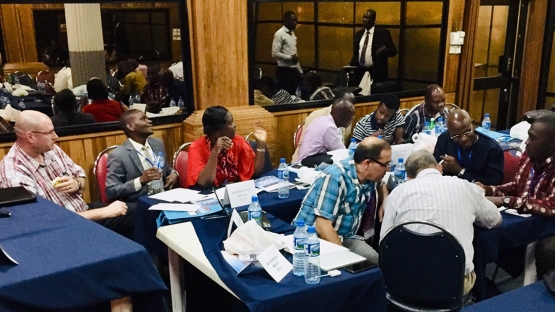In a continent with a shortage of medical physicists and training facilities for them, regional cooperation in training is key for effective and safe cancer care. The IAEA held the first ever training workshop on how to establish clinical training programmes for radiotherapy medical physicists using regional cooperation in Abuja, Nigeria from 18 to 20 December 2018.
Medical physicists play a central role in ensuring the safety, quality and effectiveness of radiation diagnosis and treatment of patients with diseases like cancer and cardiovascular diseases. Clinical medical physicists typically undertake comprehensive, structured and supervised clinical training to acquire the needed competencies to work in a hospital and contribute to patients’ healthcare.
The workshop, held in the framework of a regional technical cooperation project, consisted of lectures and discussions, focused on how to establish and manage clinical training programmes, including in-depth discussions on the role of supervisors and coordinators, the assessment of the competencies that have been acquired by the residents, and the equipment required to offer clinical training.
Twenty participants from 12 countries participated in the course, which was based on guidelines by the IAEA and the African Regional Cooperative Agreement for Research, Development and Training related to Nuclear Science and Technology (AFRA). The pre-course exercises and group work performed during the event focussed on highlighting the importance of coordination and regional collaboration, and provided participants with tools in enhancing cooperation.
“I learnt about the equipment, personnel and infrastructure needed to set up a training programme, as well as how to evaluate the training to ensure quality and competence,” said Elly Okoko, a medical physicist at the Kenyatta National Hospital in Nairobi. “In Kenya, where we are about to start a clinical training programme, it was an eye opener and a welcome supplement of information for areas we might not have included.”
Taofeeq Ige, course director and President of the Federation of African Medical Physics Organizations (FAMPO), highlighted the importance of raising awareness on the role that medical physicists play in patient care. “This course is important for regional cooperation, focussing on connecting medical physicists in the region to share human and technological resources,” he said.
The workshop emphasized the role of participants in promoting clinical training in their countries. “This training motivated me to inform the government of Mauritius and the University of Mauritius on the role we could play in developing national training with regional coordination,” said Payaniandi Pooparlen Velen, a medical physicist at the Victoria Hospital in Mauritius.
For cases in which not all competencies needed can be provided locally, for example due to a lack of supervisors or a piece of equipment, medical physicists need to visit other institutions to complete their training, Velen said. It is this kind of cooperation that this workshop facilitated.
This workshop was held in the framework of an IAEA regional project on improving access to quality radiotherapy treatment in Africa through sustainable human resource capacity building. The primary objective of this project is to improve the quality of treatment for cancer patients through the harmonization of training in medical physics and radiation oncology, skills upgrade and promotion of good practice for all radiotherapy professionals.




